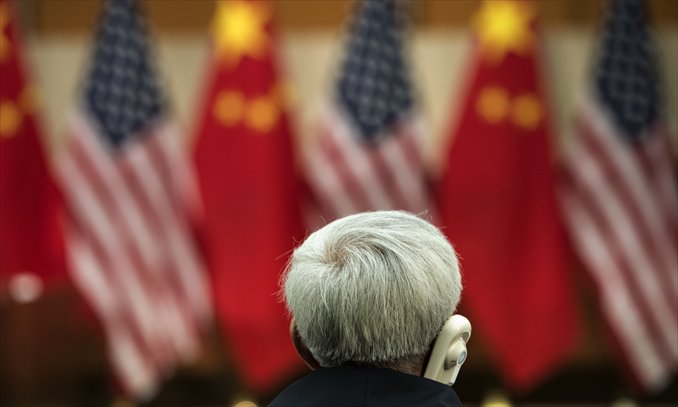Officials praise S&ED progress

An official listens during a Strategic Track Plenary Session at the US Department of State Thursday in Washington. Officials from the US and China met to discuss the two world powers' relationship. The two-day dialogue concluded Thursday. Photo: AFP
Senior Chinese and US officials highlighted progress in trade and investment in the fifth round of the Strategic and Economic Dialogue (S&ED), with the two sides reaching a crucial consensus on climate change, energy and investment in the two-day summit in Washington that concluded Thursday.
China has expressed a desire to increase its investment in US shale gas, and the two sides agreed to strike new deals to cut emissions and restart stalled negotiations on an investment treaty later this year. Meanwhile, the two countries will establish a Special Representative hotline for the two heads of state, and will explore the development of a Sino-US mutual notification mechanism for major military operations, according to China's foreign ministry.
Foreign ministry spokeswoman Hua Chunying said Friday the two sides hold that their relationship has "reached a new starting point" and that each has a stake in the other's success. Both sides are of the view that positive actions should be taken to advance the building of a new model of major power relationship in an all-round way, she said.
"A new type of major power relationship is one without confrontations, which requires the two sides to deepen cooperation and properly handle their differences," Tao Wenzhao, a research fellow with the Institute of American Studies at the Chinese Academy of Social Sciences, told the Global Times, saying both sides talked properly instead of slinging accusations over cyber security at the dialogue.
Chinese Vice Premier Wang Yang noted Thursday, while addressing a dinner at the National Committee on US-China Relations, that a principle in economic cooperation is not "politicizing business issues," which could lead to more confrontation. He also said it is important to allow differences between China and the US while the two sides seek common ground.
"The world wouldn't be the same if there was only Washington but no Beijing. It's not the same when there's only winter but no summer, or only women but no men in this world, which would be depressing," said Wang, who co-chaired the dialogue with State Councilor Yang Jiechi, US Secretary of State John Kerry and US Treasury Secretary Jacob Lew.
The two sides agreed to begin substantive negotiations on a bilateral investment treaty.
The US pledges to treat Chinese investment equally and fairly, and pledges to welcome investment from China, including investments by State-owned enterprises and sovereign wealth funds, said a statement on the US Department of State official website. The US side also pledged that security review will be based on only national security rather than other factors, the statement said.
Jin Canrong, a deputy dean of the School of International Studies at the Renmin University of China, told the Global Times Friday that the two countries have different opinions on investment although they are tapping into cooperation opportunities.
The US sometimes restricts investments from Chinese companies using the excuse of national security, in a bid to keep them from entering the US market, Jin said.
But the situation could change for the better if discussions on a bilateral investment treaty really work out, given that the two countries placed the issue as key in their dialogue this time, Jin noted.
The two countries have agreed to strengthen high-level exchanges as well as dialogue and consultation at various levels, and decided to continue to improve and develop military relations and explore the establishment of a notification mechanism for major military activities.
China and the US have been holding the annual S&ED talks since 2009 when US President Barack Obama came to power, as a major channel to enhance mutual trust, boost cooperation and properly handle differences.
Tao said, "Generally speaking, the dialogue has lived up to people's expectations."
He noted that the military notification mechanism is "refreshing."
"Distrust between China and US can be most obviously observed in their military relations," Tao said, explaining that the two sides decided to discuss a notification mechanism because they have realized that military relations should become part of their new relationship.
A hotline for the two heads of state shows the two countries need closer and more frequent communication and interactions, he said, and that they need negotiations to enhance mutual trust and avoid wrong judgments.
Wang Zhaokun and Xinhua contributed to this story